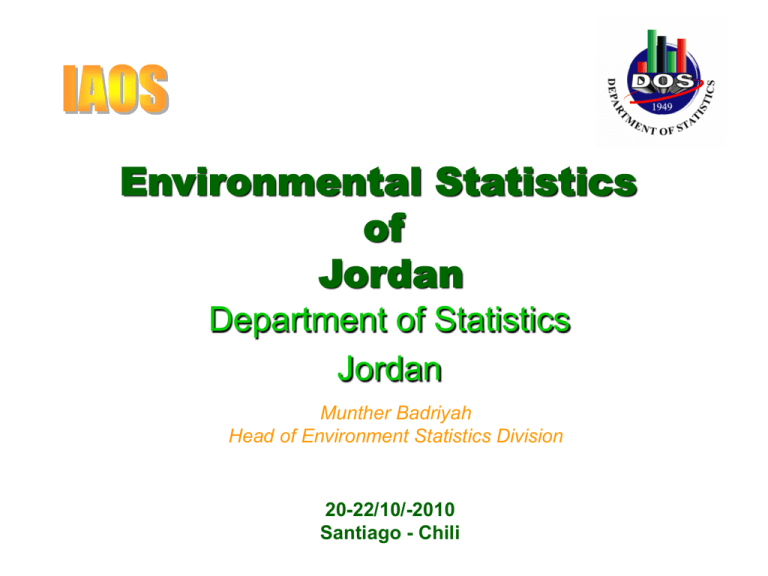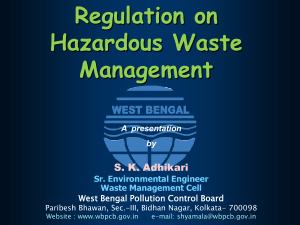Environmental Statistics Jordan
advertisement

Environmental Statistics of Jordan Department of Statistics Jordan Munther Badriyah Head of Environment Statistics Division 20-22/10/-2010 Santiago - Chili Introduction Environment is defined as the overall outer conditions affecting life, growth and beings existence. The environmental system is distinguished in the balance among its elements (i.e. water, air and land) and it can adapt, within certain limits, with changes that may occur. But, life development, technological advancement and introduction of machines, chemicals, radioactive items, various sources of power generation, exhaustion of natural resources, occurrence of catastrophes due to human activities such as nuclear explosions in addition to the use of fertilizers and pesticides, all these lead to environmental disequilibrium and many environmental problems. So, environmental protection must be taken seriously in order to reduce these problems. It should be given top priority by the public and private sectors because each being has the right to live in a balanced, clean and pollution-free environment. Jordan was one of the pioneer countries to exert extensive efforts in the field of environmental protection. Accordingly, many directorates and divisions dealing with environmental issues were established in various governmental institutions, in addition to the establishment of the Ministry of Environment. Moreover, the Government issued the Environment Protection Law, and continuously supports the non-governmental organizations interested in this subject. In continuation with the above mentioned, the Department of Statistics established the Environment Statistics Division which is always keen to improve its work to provide comprehensive statistical data in this field. The decision makers, policy makers, planners and researchers can benefit a lot by the comprehensive environmental database available at DoS. Part of this data is published in this report and more will be published in the future. Objectives of the Environmental Statistics A.Provision of statistical data on various environmental elements and their distribution in Jordan. B. Provision of data on available natural resources, deposits and safe exploitation of these resources. C. Provision of data on environmental pollutants by type, source and their effects on environment. D. Provision of data for various environmental indicators. E. Creating environmental database. F. Provision of information on procedures used to protect the environment Sources of Environmental Statistical Data The required data are collected from the following sources: 1 - Administries Registries from Ministries, Governmental Departments, and Public and Private Institutions 2 - Directorates and Divisions Working Within the DoS 3 - Surveys and Studies Sources of Environmental Statistical Data 1 – Administries Registries from Ministries, Governmental Departments, and Public and Private Institutions The statistical data is collected from various governmental institutions according to their specialty, and from public and private institutions and associations dealing with this subject. Continuous coordination with these institutions is maintained to obtain up-to date data and information for inclusion in the environmental statistics report. After collection, data are checked and classified. In case there were any mistakes or conflicts in the data, contacts are made with concerned parties to carry out the necessary corrections. Sources of Environmental Statistical Data 2 - Directorates and Divisions Working Within the DoS Data are collected from various directorates in the DoS, whether these data are published or not. Some environmental indicators are calculated while some other data are re-tabulated in the form of tables for inclusion in this report. These directorates are: A. Directorate of Agricultural and Environmental Statistics. B. Directorate of Economic Statistics. C. Directorate of Population and Social Statistics. D. Directorate of National Account. Sources of Environmental Statistical Data 3 - Surveys and Studies For the purpose of this study, many surveys are carried out, these are: A. Hazardous solid and liquid wastes survey in the medical services Activity, Chemical Production Industry. B. Solid Wastes survey for the Municipalities Activity. C. Non-Hazardous Solid and Liquid Waste survey in the construction, Industry, Services, Agriculture (plants, stock). The Sectors and Activities of Environment Statistics 1. Natural Conditions 2. Population Indicators 3. Health Indicators 4. Economic Indicators 5. Pesticides Residuals 6. Agricultural Indictors 7. Transport 8. Air Pollutants 9. Biodiversity, Forests, and Eco-tourism 10. Water Quality and Quantity 11. Pollution of Aqaba Gulf Water 12. Energy and Natural Resources 13. Medical Services survey 14. Hazardous Industry survey 15. Municipalities survey 16. Non- Hazardous Wastes survey 17. Environmental Account (Water Account) 18. Sustainable Development Indicaters of Environment 19. Environment Expenditure Data Surveys General Background Introduction Several surveys have been implemented during 2009 at the national level for the construction, medical services, construction, municipalities and chemical industrial, in order to collect data pertaining to 2008 on the uses of water and energy and hazardous and non-hazardous solid and liquid wastes produced by these activities, and the objectives of these Surveys. A. Provision of statistical data on solid and liquid wastes (hazardous and non-hazardous). B. Provision of data on the quantities of used water and sewage, in addition to methods of disposal and treatment. C. Provision of data on quantity, type and value of consumed energy. D. Provision of information on procedures taken to protect the environment Surveys General Background Surveys Coverage The surveys covered a representative sample on the governorate level for activities of the constructions, while the manufacturing of chemical materials activities were covered by a comprehensive survey for certain industrial activities and a reprehensive sample of other activities, while a comprehensive survey was used for public and private hospitals and municipalities. The Surveys Frame The Enterprises Census carried out in 2006 provided a comprehensive frame for economic establishments. This frame has been used to design the environmental surveys samples. Surveys Main Documents 1 Surveys Questionnaires A. The medical services questionnaire contains the following components: - Identification information on the establishment. - Quantity and value of water used in the establishment. - Quantity of sewage and method of disposal. - Quantity, type and value of energy used by the establishment. - Used commodity requirements. - Quantity of wastes by item, type and method of disposal. - Fixed assets of the establishment designated for the protection of environment. B. The construction activity questionnaire contains the following components: - Identification information on the establishment. - Quantity and value of water used and quantity of sewage produced by the establishment. - Disposal method of sewage. - Quantity, type and value of used energy. - Wastes produced and method of disposal. C. The municipalities questionnaire contains the following components: - Identification information of the establishment. - Quantity of waste by type and method of disposal. - The expenditure of the disposal of the waste. D. The questionnaire of the industrial survey contains the following components: - Identification information on the establishment. - Quantity and value of water used and quantity of sewage produced by the establishment. -Disposal method of sewage. - Wastes produced and method of disposal. - Quantity, type and value of used energy. Instructions Manuals Which Includes: A. Instructions Manual for completing the questionnaire and explaining the concepts and terms mentioned therein. B. Editing rules manual for checking data consistency, logically …etc. C. Special manual for coding the different components of the questionnaire. Data Collection Stage Data Processing Stage Electronic Processing Electronic Processing Challange of Collection Data 1 – Non Avialable data 2 – Classification is not clear 3 – Harmonization of Definition 4 – No Cooporation or Startegy Plan with the other Institutes 5 – No International website for the Environment Information data









